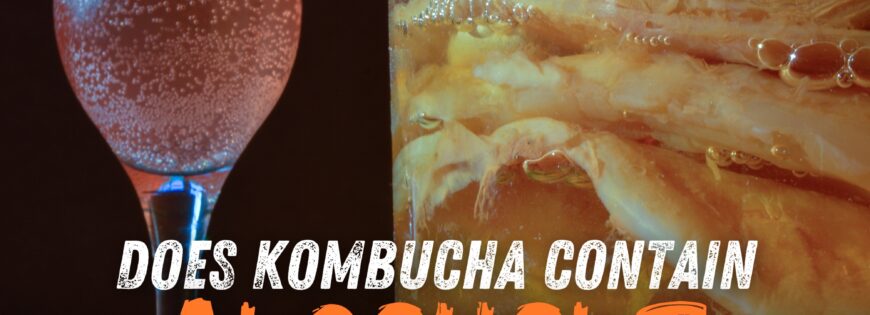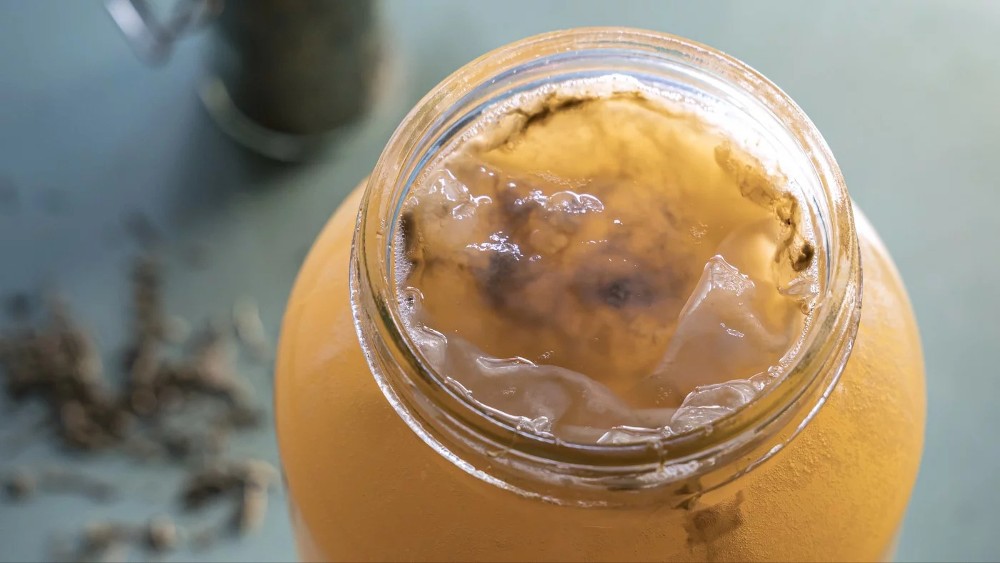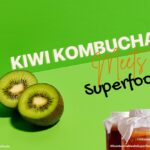Kombucha has taken the health and wellness world by storm, praised for its probiotic benefits and unique taste. However, a common question arises: does kombucha contain alcohol? Let’s find out if it is called alcoholic kombucha or not. In this blog post, we’ll delve into the world of alcoholic kombucha, its production processes, and what you need to know about its alcohol content.
Is alcoholic kombucha or non-alcoholic kombucha?
It is quite surprising to hear that the answer is both “yes” and “no.” As a fermented drink, kombucha inherently contains trace amounts of alcohol due to the fermentation process and the yeast involved. So, the answer is “yes.” – alcoholic kombucha. However, most kombucha found in your local grocery store is not classified or labeled as an alcoholic beverage, making the answer “no” as well. How does this work?
In the U.S., for kombucha to be classified as a “non-alcoholic beverage,” it must have an alcohol by volume (ABV) of less than 0.5%. Different countries have varying standards and definitions for what constitutes “non-alcoholic” or “alcohol-free.” The small amounts of alcohol present in properly fermented kombucha are not enough to cause intoxication and actually act as a natural preservative.
Why does kombucha contain alcohol?
You may be curious about how fermentation results in trace amounts of alcohol in kombucha. Let’s break it down with a quick lesson in organic chemistry.
Kombucha starts as sweetened tea that is fermented with a SCOBY (Symbiotic Culture of Bacteria and Yeast, sometimes referred to as “tea fungus”). During fermentation, the SCOBY breaks down the sugar in the tea into fructose and glucose, which are then converted into ethanol (alcohol). The SCOBY further oxidizes this ethanol, creating organic acids like acetic acid (the primary component of vinegar, after water) and giving kombucha its characteristic tart flavor. So that’s when we call alcoholic kombucha.
These natural chemical processes not only shape the taste of kombucha but also contribute to its nutritional benefits, much like those found in other fermented foods such as pickles, kimchi, and yogurt. Although more extensive clinical trials are needed, several studies suggest a positive link between drinking kombucha and various health benefits, including improved gut health, reduced inflammation, better skin health, liver support, and even diabetes management. The specific health benefits of alcoholic kombucha may depend on factors such as the type of sugar used, fermentation time, and the composition of the SCOBY for each batch, according to researchers.
Read more: Kombucha Meets Superfoods: Apple Kombucha
How much alcohol is in kombucha?
The amount of alcohol in each batch of kombucha varies based on several factors, primarily fermentation time and the type of yeast used.
Homebrewed kombucha often has a slightly higher ABV than commercial varieties, with many homebrewers reporting averages between 0.5% and 3%—still significantly lower than the ABV of a typical hard seltzer, which is around 5%.
Commercial brewers employ various methods to remove alcohol from their products, ensuring they meet the 0.5% ABV requirement. At Wana, our in-house lab technicians dedicate extensive time to researching, testing, and refining our process to optimize it for our fruit and botanical-infused kombucha. Our proprietary approach utilizes numerous tools without the need for any preservative chemicals.
However, it’s important to note that regardless of the precautions taken by home or commercial brewers, kombucha’s ABV can rise if not stored correctly. Similar to how steeping time affects caffeine levels, fermentation time influences alcohol production. Studies indicate that if kombucha is at temperatures above 39.2°F, it will likely continue fermenting and produce more alcohol. (A reminder: the U.S. Food & Drug Administration recommends setting all refrigerators to 40°F or lower, with 37°F being the ideal temperature.) Therefore, proper storage is crucial for all refrigerated products.
How much alcohol is in Wana Kombucha?
We conduct thorough laboratory testing to ensure that the ABV of our open-air fermented, 100% raw, and unpasteurized kombucha remains below 0.5%, provided it is stored properly in refrigeration. With an ABV under 0.5%, our kombucha is classified as a non-alcoholic beverage.
Making Alcoholic Kombucha in The Industry
“Hard kombucha” refers to the higher-alcohol version of kombucha, catering to those over 21 who seek an alternative to traditional bar options. There are a couple of methods to achieve this. One approach involves adding alcohol to a finished kombucha brew. Another method mirrors the traditional fermentation process but includes multiple fermentation stages to boost alcohol content. After the initial fermentation, many brands introduce additional sugar and yeast to kickstart a second fermentation, converting that sugar into more alcohol. Depending on the brand, alcohol content can range from 3% to about 8%. Research on the presence of probiotics and other health benefits in hard kombucha is still in progress.
In summary, kombucha can contain alcohol, and the production of alcoholic kombucha is becoming increasingly popular within the beverage industry. Whether you’re a fan of its health benefits or simply looking for a refreshing drink with a twist, alcoholic kombucha offers a unique option that appeals to a wide audience. Always check labels to understand the alcohol content, especially if you’re curious about trying this fermented delight. Cheers to discovering your new favorite beverage!





